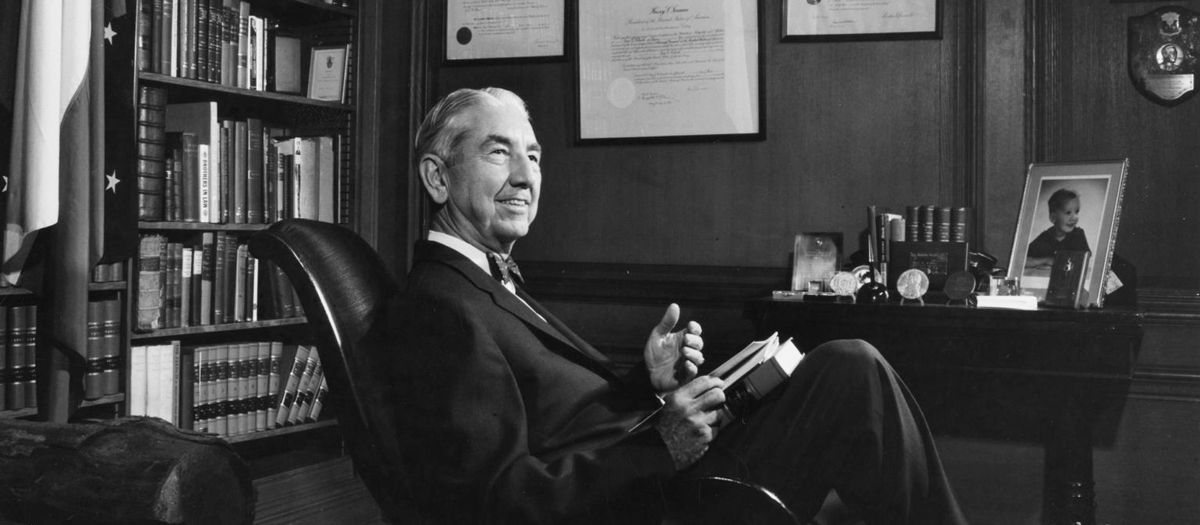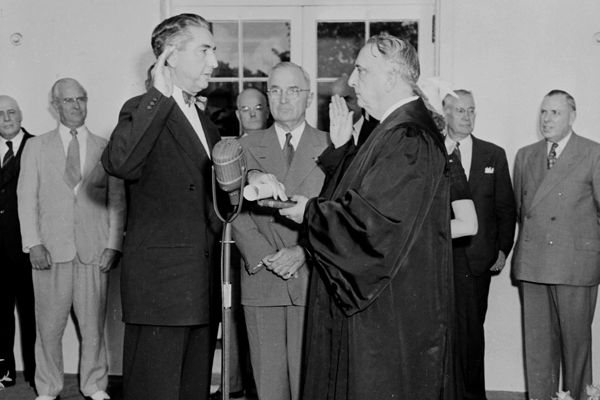Before Thomas C. Clark (University of Texas at Austin, 1922) was a lawyer, attorney general and a Supreme Court justice, he was a Delt.
After serving the Texas National Guard during World War I, Clark enrolled in the University of Texas at Austin and received a Bachelor of Arts degree in 1921. He then received a law degree from the University of Texas School of Law.

Upon admission to the Texas bar, Clark set up a law practice in his hometown from 1922 to 1937. He left his private practice to serve as the Dallas district attorney from 1927 to 1932 before resuming his private practice for four more years.
Clark joined the Justice Department in 1937 as a special assistant to the attorney general, working in the war risk litigation section. He later moved to the antitrust division, which was then run by legendary trust-buster Thurman Arnold, and in 1940, Clark moved to head the department’s west coast antitrust office.
In 1943, Clark was promoted to the assistant attorney general for antitrust and subsequently became the justice department’s criminal division head. Clark was also appointed to lead a new war fraud unit, a unit created to investigate and prosecute government contractors’ corruption. During this period, he worked closely with and befriended President Harry Truman.
One of President Truman’s first changes in the cabinet that he inherited from Franklin Roosevelt was his appointment of Tom Clark as attorney general in 1945, a switch made in part because of the close personal and professional relationship shared by the two men.
“Brother Tom Clark committed his energies not only to the Court but to his many other interests first and foremost of which was Delta Tau Delta. One of his favorite expressions was, ‘Once a Delt, always a Delt.’ He lived by this phrase, which he used in so many speeches to Delts.” - Alfred P. Sheriff, III (Washington & Jefferson College, 1949)
The skilled lawyer had his first introduction to the American public in 1945 by Time Magazine. The article described the new attorney general as “The Man with the Bow Tie,” writing, “He has a collection of 50 bow ties, an authentic cowboy stetson, a broad grin and a soft southern drawl.”
As attorney general, Clark also helped guide the creation of a presidentially established committee on civil rights. The committee released an influential report titled “To Secure These Rights,” which provided 35 recommendations, including ending segregation, eliminating poll taxes, enacting a law to protect voting rights and creating a civil rights division at the Department of Justice. The report had a significant and lasting influence on civil rights providing, as Tom Clark later said, “a blueprint of most everything that’s been done in the area of civil rights since that time.”
Clark intended to return to private practice in Texas after working on President Truman’s reelection campaign. However, the death of Supreme Court Justice Frank Murphy prompted Truman to nominate Clark to fill the vacancy in 1945. Clark faced a challenging confirmation process. He received criticism for his lack of judicial experience, among other things. Nonetheless, the Senate confirmed Clark for the bench by a 73-8 vote on August 18, 1949.

Clark backed decisions supporting government enforcement of laws designed to promote racial equality. To this end, he led or played a critical supporting role in many of the Supreme Court’s landmark decisions in this area. Several rulings by the Supreme Court, most notably Sweatt v. Painter and McLaurin v. Oklahoma State Regents (1950), held that Black graduate students must be allowed into white state universities and law schools. The case ruled that a separate Black school could not provide equal quality education due to systemic inequity. This ruling helped lay the groundwork for later cases, including the landmark Brown v. Board of Education (1954).
In 1962, the Karnea elected Clark as vice president of Delta Tau Delta. Some members felt that his principal service to the Fraternity would be by adding his name’s prestige, given his status. Other members thought that the demands and restraints of his position on the Supreme Court would impose severe impediments on his work for the Fraternity. Whatever hindrances there may have been, Clark overcame them. Whenever there was a Fraternity assignment that called for Clark’s capabilities, Clark applied his best efforts to serve the Fraternity.
It was no surprise that at the 68th Karnea, Clark was named the 28th president of the Fraternity. His primary goal was to develop an even closer relationship among undergraduates, alumni and the Arch Chapter.
Clark enacted two significant strategies for the Fraternity. First, he created the President’s Council—the precursor to the Undergraduate Council—to provide an undergraduate perspective on the organization’s challenges. So successful was the President’s Council that it has remained relatively unchanged to this day. Second, Justice Clark appointed Fraternity treasurer and future International President DeWitt Williams (Washington, 1929) to propose an extensive overhaul of the Fraternity Constitution and Bylaws.
Clark served on the Supreme Court for 17 years. On June 12, 1967, he retired when his son was appointed the attorney general. Thurgood Marshall succeeded Clark and was the first African American to be confirmed as a Supreme Court justice.
Following his retirement, Clark served as the first chairman of the Federal Judicial Center, created by Congress to improve federal court administration. Clark also accepted assignments to sit by designation on various U.S. Courts of Appeals until his death on June 13, 1977, at age 77. Δ
